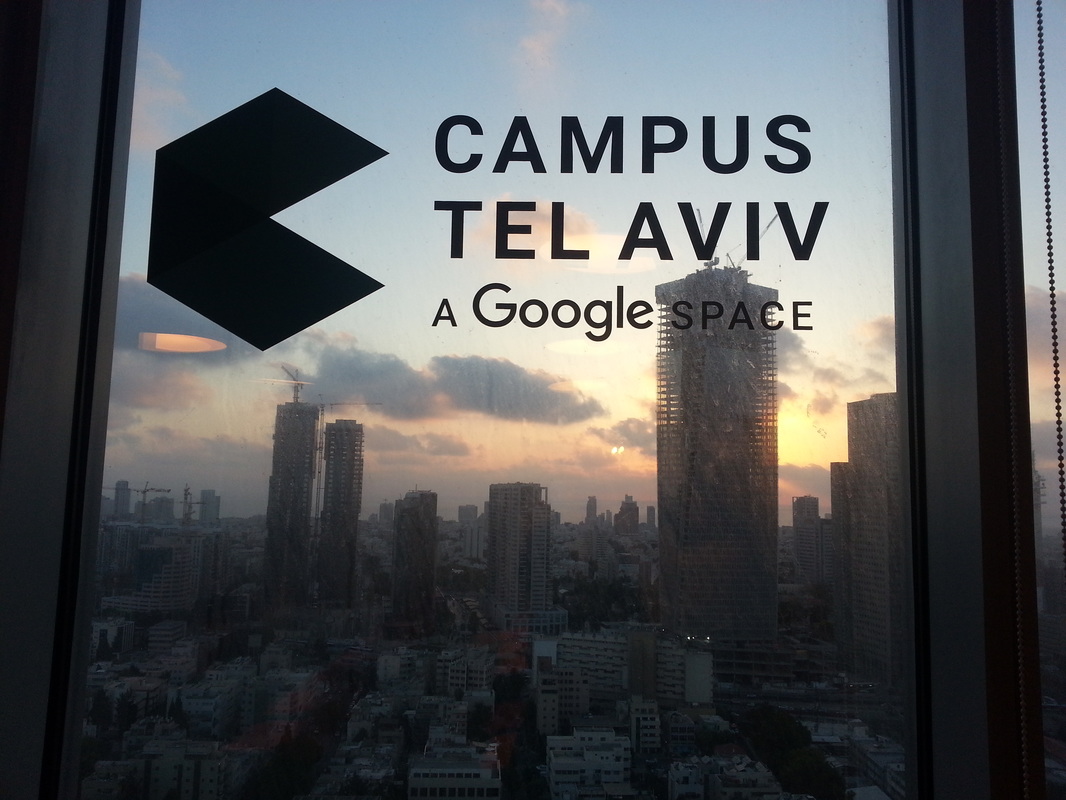|
Part I of a 3-part series by Jessica Khaimova
When you think of hi-tech and innovation, places like Silicon Valley or companies like Google, Microsoft, Intel, or Facebook pop into mind, right? But when you think of the Middle East, specifically Israel, those would perhaps be the last phrases to enter your thoughts. Well, as it turns out, there is an ever-growing hub of technological innovation in Israel, also known as the start-up nation or “Silicon Wadi.” And this summer, I had the opportunity to experience this first-hand as an intern at the start-up onlinepianist.com, a tutorial-based website and app that teaches people how to play popular songs on the piano.
Before I begin, let me provide a disclaimer. This is not meant to be a political post by any means. I am simply describing the phenomenon of how a small, ~20,770 km², 68 year old nation happens to have the world’s second best start up ecosystem, after Silicon Valley. This is according to the first data-driven ranking and analysis of 50,000 start-ups worldwide. This article will be divided into a three-part series. The first part will concisely shed light on this, the second will be about my experience as an intern at a start-up in Tel Aviv, and the third will be about women in the start-up realm.
A Technological Oasis in the Middle East: A Brief Explanation of the Start Up Nation I know what you’re thinking: Israel – a start-up nation? But how? It’s a long story that will take an entire book to explain (see Start Up Nation by Dan Senor and Saul Singer). For now, however, I will briefly present you with the info that got me fascinated with the Israeli start-up scene and will share some words from people who are making this a reality. First, let’s look at the land. Most of the start-ups are concentrated in the center, the Tel Aviv region, which happens to be the most populous area and among the narrowest part of the country, which is around 9 miles, or 15 km, wide. Yes, as wide as a city. And it’s home to 1/1000th of the world’s population. As said by Senor and Singer in Start Up Nation, all of these conditions “make Israelis skeptical of conventional explanations about what is possible.” So, they innovate. Israel leads the world in the “percentage of the economy that is spent on research and development” (Senor and Singer, UNDP Report 2007/2008) and various top-tier tech companies and investors around the world are noticing this. Companies such as Intel and Microsoft have set up large Research and Development centers in Israel. As a matter of fact, according to Senor and Singer, “almost half the world’s top technology companies have bought start-ups or opened R&D centers in Israel.” Also, “Microsoft’s Steve Ballmer has called Microsoft ‘an Israeli company as much as an American company.’ [And] an American executive from eBay said, ‘Google, Cisco, Microsoft, Intel, eBay … the list goes on. The best kept secret is that we all live and die by the work of our Israeli teams. It’s much more than just outsourcing call centers to India or setting up IT services in Ireland. What we do in Israel is unlike what we do anywhere else in the world.’” This international involvement helps to explain “why, in addition to boasting the highest density of start-ups in the world (a total of 3850 start-ups, one for every 1,844 Israelis), more Israeli companies are listed on the NASDAQ exchange than all companies from the entire European continent” (Senor and Singer). As a matter of fact, after the United States, Israel has more companies listed on the NASDAQ than any other country in the world. Note that this statistic is from 2009. The number of start-ups has since drastically risen even though many Israeli companies are making exits (being bought by larger companies for millions and even billions of dollars). That can be a good thing, too. In 2015, for example, while the number of start-ups rose by 1400, 54 start-ups produced exits in the first half of the year, making 5.29 billion USD – the overall amount in 2014! Case in point: Waze. Google purchased this Israeli map app in 2013 for $1.15 billion, serving as the first Israeli consumer-app company to be bought for over a billion dollars. Ever heard of Viber? This Israeli messaging app was acquired by Japan’s Rakuten for $900 million in 2014. Now, more and more companies are focusing on building their industries rather than selling them. In Start Up Nation, Senor and Singer mention that “Warren Buffett, the apostle of risk aversion, broke his decades-long record of not buying any foreign company with the purchase of an Israeli company – for $4.5 billion – just as Israel began to fight the 2006 Lebanon war.” Here’s something else to consider: Israel has been involved in conflicts with its neighbors ever since its foundation in 1948 (the War of Independence). But are the start-ups affected by this? Let’s take a look. “During the six years following 2000, Israel was hit not just by the bursting of the global tech bubble but by the most intense period of terrorist attacks in its history and by the second Lebanon war” (Senor and Singer). Can you guess what happened during this time? Well, “Israel’s share of the global venture capital market did not drop – it doubled [!] from 15% to 31% … Israeli political economist Gidi Grinstein said, ‘Look, we doubled our economic situation relative to America while multiplying our population fivefold and fighting three wars. This is totally unmatched in the economic history of the world.’ And, he [said], the Israeli entrepreneur continues to perform in unimaginable ways.” People clearly think that this is the place from which lots of big ideas will originate. Google’s CEO and chairman, Eric Schmidt, has said that “after the US, Israel is the best” for entrepreneurship (Senor and Singer). “Gary Shainberg, British Telecom’s VP for technology and innovation told [Dan Senor and Saul Singer], ‘There are more new innovative ideas, as opposed to recycled ideas – or old ideas repackaged in a new box – coming out of Israel than there are out in [Silicon] Valley now. And it doesn’t slow during global economic downturns.’” And how is this happening? What is it about Israel that makes its start-up scene so distinct, audacious, and globalized? There are lots of ideas surrounding this. Assaf Luxembourg, CEO of crowdmii.com, shared his thoughts on this subject: “I believe that non-related to external factors, there are internal factors which allowed Israel to grow itself into a world-leading cluster of innovation and entrepreneurship. Many of these internal factors are related to the culture and the ethos of Israel. Two main factors are a) The ‘home’ factor - Israelis feel very ‘at home’ in Israel, which allows them to ‘be themselves’ more, take more risks, be more creative and open to new ideas, etc., and b) A sense of purpose - That notion that ‘we are a part of something that is bigger than us’ allows for more risk taking and failure acceptance. All and all, these internal cultural factors provide the right ground for ‘creative energy’, which I believe is a big part of the ‘DNA’ of the ‘Israeliness.’” What does the future look like for the unique Israeli start-up culture? Will more companies exit or will they stay and build billion dollar industries? Mr. Luxembourg said, “We will have to make more efforts to maintain our local cluster relevant in a fast growing more competitive market. We will have to find out how we preserve our relative cultural advantages. We will have to learn how to grow more mature companies, and not just a lot of start-ups which are acquired in early stages.” Read Part II of Jessica’s 3-part series at A Start Up Nation Summer Read Part III of Jessica’s 3-part series atWomen in Israeli Tech Start Ups 
About the Author
Jessica Khaimova, a native New Yorker, graduated from the City University of New York, Brooklyn College in June 2016 with Bachelor's Degrees in environmental and atmospheric science and fiction writing. She is an avid fan of writing, astronomy, science fiction shows (such as Doctor Who), tea, tech, autumn, and cats. Comments? Leave them below!
0 Comments
Leave a Reply. |
SPOTLIGHTSMeet our Scientista Spotlights -- current-day women in STEM and women from science history -- and find your role model! Read opinion editorials and history pieces to get additional inspiration.
WHAT'S NEWYOU MIGHT ALSO LIKE
WHAT'S HOTCONNECT WITH USARCHIVES
June 2018
|
The Scientista Foundation, Inc. All Rights Reserved © 2011-2021 | Based in NY | [email protected]
The Network for Pre-Professional Women in Science and Engineering
The Scientista Foundation is a registered 501(c)(3) -- Donate!
The Network for Pre-Professional Women in Science and Engineering
The Scientista Foundation is a registered 501(c)(3) -- Donate!










 RSS Feed
RSS Feed